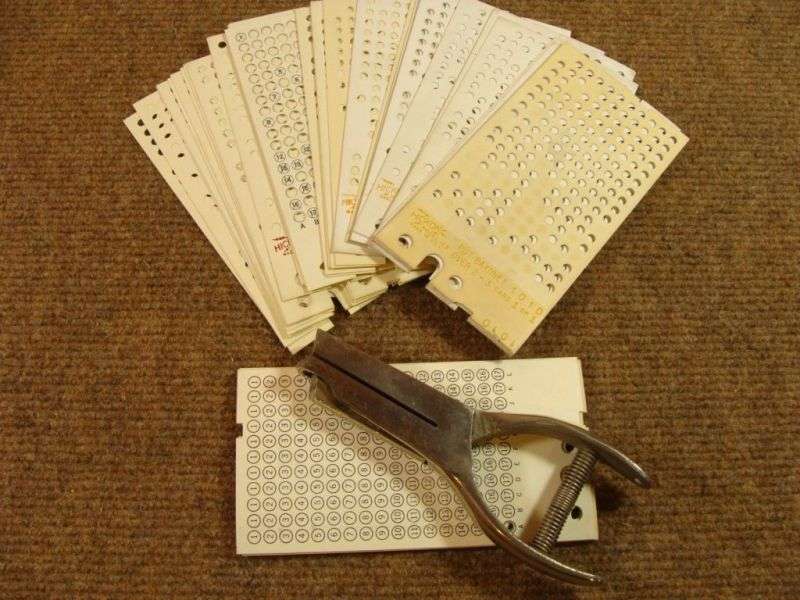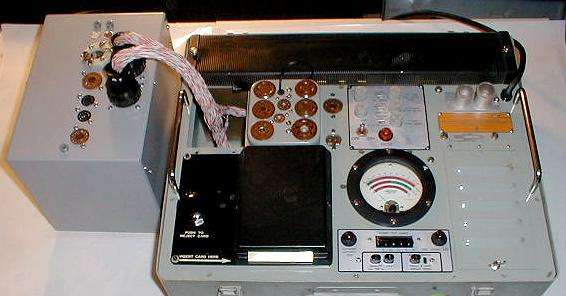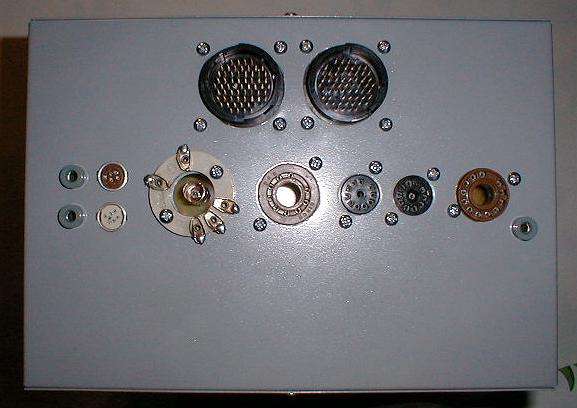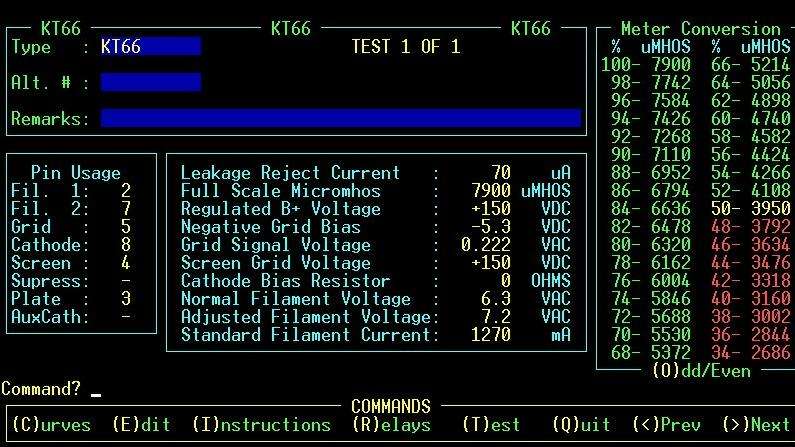This is a repost from the currently-defunct CB Tricks forum. This post is almost three years old, but seemed interesting enough to repost here.
Just bought a new tube tester! Wahoo!
So, just how much of a geek must you be to get excited over something as intrinsically boring and fundamentally yawn-inducing as a TUBE TESTER ? ? ? Sure sounds like watching-paint-dry territory, doesn't it?
I'll leave that for the enlightened reader to answer for yourself.
Here's a link to the web site where you can buy one for yourself http://www.tubesontheweb.com
We upgraded to Hickok Cardmatic 123R tube testers 7 or 8 years ago when the last of our "U-Test'M" upright store-type testers finally died forever. Those were easy to use, needing only three knobs to be set. It had over a hundred sockets on it, so you needed only to plug into the socket indicated on the chart. Simpler-looking "shop"-type testers have a dozen or more switches and knobs and only one socket of each type. They are more work to use, since you have to set it up for each different type.
The Cardmatic takes all the setup switches and moves them into a punch-card reader. The hole pattern in the card determines which spring-loaded switch pins are open, and which are closed. The hole pattern in the card takes the place of a roll chart showing where to set all those switches. It's a lot less labor and MUCH faster to use.

But only if you have the card for that tube. Found that putting the cards back where they belong can be harder than it sounds. If you can't find the card you need, you can't test that tube. If you need a card you don't have, it's incredibly laborious to punch your own. And that's if you have the hole pattern to copy it from. If not, you would need to figure it out for yourself.
Yeah.
First time I saw a Cardmatic 30-plus years ago I had the idea of replacing each of those little pin switches each with a relay and controlling the setup with a computer.
Okay, so all that gets me is a "Captain Obvious" badge. Good ideas are a dime a dozen at best. But Phil Frakes in Colorado took the idea and made it a reality. Seeing all the details he had to work out over several years of revisions makes me incredibly relieved that I didn't undertake it. And SOMEBODY had to translate thousands of punch-card patterns into the setup-database records. Better him than me.

Biggest attraction of all is that it's a lab-grade instrument that can be CALIBRATED! Had some doubts about the accuracy of the older testers we had used. Mostly just compared the readings of brand-new tubes and used that as a guide. Seemed to work well enough for decades. Still left me a bit skeptical about the test results sometimes. The Cardmatics are calibrated with a special set of cards and a precision zener diode reference.
This thing ROCKS! All of the settings can be tweaked if you don't quite like the standard test conditions. Our next project for it is an external adapter socket to test Eimac 3CX400 and 3CX800-type tubes. Won't put anywhere near 2000 Volts on the anode, but most of the faults that can damage your linear will show up just fine. Mostly I'm concerned about tube faults that blow up your amplifier when the power is applied. A weak tube would still show reduced power in a linear. But this test should sort out the ones that will blow out a slew of soldered-in components and plaster the plate choke when you key the mike. And in a box with two of those tubes, if it goes "POP!" all you really know is that at least one tube is bad. Which one? Both? Just too expensive a test method for me.

Phil calls this thing the "Bitmatic". It has virtual "cards" in the program's database for over 3900 tubes. The nuisance of punching a blank card is replaced with entering parameters into a database record. Only had to hand-punch a dozen or so test cards to consider this an IMMENSE improvement.

One feature of all the Cardmatics is that you can do a "current" test in addition to the usual transconductance test. Power tubes like the sweep tubes used in linear amplifiers can still test okay on a 'normal' tester's small-signal gain and fall flat when you try to get power out of it. The current test grounds the tube's grid, puts a power resistor in line with the tube's plate and shows how much current it will pull. Turns out that this is a better guide to matching parallel tubes in a Palomar, Maco or Varmint than the more-common transconductance test. And a lot safer than keying up and watching to see which of six final tubes "cherries up" before the others.
I expressed the inevitable second thoughts about spending thousands of bucks on something this mundane. My helper quickly pointed out that saving the labor we waste looking for cards would pay for it in a year or less. Could not dispute his logic, and the last of my doubts evaporated right there.
Most popular test lately is the 572B tube. We use the setup for the 811A. With only 250 Volts on the plate, they are effectively the same tube. The software gooses the filament voltage to compensate for voltage drop in the wiring and the tube gets the full 6.3 Volts on the cathode. Ever since RF Parts ran out of this type, used and "weak" tubes are coming out of closets and basements. Identifying the tubes most likely to make an amplifier go "SNAP!" is just better than crossing fingers before keying the mike.
Nothing lasts forever. Sooner or later this tester will take a dump. With any luck, we'll get it fixed and back on line. I'm keeping one of the 123R testers as our standby, and to compare with this one any time there's an odd reading. But the "spare" Hickok Cardmatic 123R is getting sold. Gotta finish cleaning it up and deciding which cards to include with the sale. Can't imagine it would bring any money without them, whatever its condition. A quick check of Ebay reveals they aren't selling all that well these days.
BTW, the model 123R is NOT convertible to the Bitmatic setup. Only the big-brother model, called the Hickok "1234", miltary USM-118 and Western Electric's version KS-15874 will work with it.
Since I got this thing we have "discovered" box after box of questionable tubes that were put aside to be tested "someday". Must have been a ten or fifteen-year backlog. Pretty sure this thing paid for itself by the time we got near the bottom of this pile.
73
Just bought a new tube tester! Wahoo!
So, just how much of a geek must you be to get excited over something as intrinsically boring and fundamentally yawn-inducing as a TUBE TESTER ? ? ? Sure sounds like watching-paint-dry territory, doesn't it?
I'll leave that for the enlightened reader to answer for yourself.
Here's a link to the web site where you can buy one for yourself http://www.tubesontheweb.com
We upgraded to Hickok Cardmatic 123R tube testers 7 or 8 years ago when the last of our "U-Test'M" upright store-type testers finally died forever. Those were easy to use, needing only three knobs to be set. It had over a hundred sockets on it, so you needed only to plug into the socket indicated on the chart. Simpler-looking "shop"-type testers have a dozen or more switches and knobs and only one socket of each type. They are more work to use, since you have to set it up for each different type.
The Cardmatic takes all the setup switches and moves them into a punch-card reader. The hole pattern in the card determines which spring-loaded switch pins are open, and which are closed. The hole pattern in the card takes the place of a roll chart showing where to set all those switches. It's a lot less labor and MUCH faster to use.

But only if you have the card for that tube. Found that putting the cards back where they belong can be harder than it sounds. If you can't find the card you need, you can't test that tube. If you need a card you don't have, it's incredibly laborious to punch your own. And that's if you have the hole pattern to copy it from. If not, you would need to figure it out for yourself.
Yeah.
First time I saw a Cardmatic 30-plus years ago I had the idea of replacing each of those little pin switches each with a relay and controlling the setup with a computer.
Okay, so all that gets me is a "Captain Obvious" badge. Good ideas are a dime a dozen at best. But Phil Frakes in Colorado took the idea and made it a reality. Seeing all the details he had to work out over several years of revisions makes me incredibly relieved that I didn't undertake it. And SOMEBODY had to translate thousands of punch-card patterns into the setup-database records. Better him than me.

Biggest attraction of all is that it's a lab-grade instrument that can be CALIBRATED! Had some doubts about the accuracy of the older testers we had used. Mostly just compared the readings of brand-new tubes and used that as a guide. Seemed to work well enough for decades. Still left me a bit skeptical about the test results sometimes. The Cardmatics are calibrated with a special set of cards and a precision zener diode reference.
This thing ROCKS! All of the settings can be tweaked if you don't quite like the standard test conditions. Our next project for it is an external adapter socket to test Eimac 3CX400 and 3CX800-type tubes. Won't put anywhere near 2000 Volts on the anode, but most of the faults that can damage your linear will show up just fine. Mostly I'm concerned about tube faults that blow up your amplifier when the power is applied. A weak tube would still show reduced power in a linear. But this test should sort out the ones that will blow out a slew of soldered-in components and plaster the plate choke when you key the mike. And in a box with two of those tubes, if it goes "POP!" all you really know is that at least one tube is bad. Which one? Both? Just too expensive a test method for me.

Phil calls this thing the "Bitmatic". It has virtual "cards" in the program's database for over 3900 tubes. The nuisance of punching a blank card is replaced with entering parameters into a database record. Only had to hand-punch a dozen or so test cards to consider this an IMMENSE improvement.

One feature of all the Cardmatics is that you can do a "current" test in addition to the usual transconductance test. Power tubes like the sweep tubes used in linear amplifiers can still test okay on a 'normal' tester's small-signal gain and fall flat when you try to get power out of it. The current test grounds the tube's grid, puts a power resistor in line with the tube's plate and shows how much current it will pull. Turns out that this is a better guide to matching parallel tubes in a Palomar, Maco or Varmint than the more-common transconductance test. And a lot safer than keying up and watching to see which of six final tubes "cherries up" before the others.
I expressed the inevitable second thoughts about spending thousands of bucks on something this mundane. My helper quickly pointed out that saving the labor we waste looking for cards would pay for it in a year or less. Could not dispute his logic, and the last of my doubts evaporated right there.
Most popular test lately is the 572B tube. We use the setup for the 811A. With only 250 Volts on the plate, they are effectively the same tube. The software gooses the filament voltage to compensate for voltage drop in the wiring and the tube gets the full 6.3 Volts on the cathode. Ever since RF Parts ran out of this type, used and "weak" tubes are coming out of closets and basements. Identifying the tubes most likely to make an amplifier go "SNAP!" is just better than crossing fingers before keying the mike.
Nothing lasts forever. Sooner or later this tester will take a dump. With any luck, we'll get it fixed and back on line. I'm keeping one of the 123R testers as our standby, and to compare with this one any time there's an odd reading. But the "spare" Hickok Cardmatic 123R is getting sold. Gotta finish cleaning it up and deciding which cards to include with the sale. Can't imagine it would bring any money without them, whatever its condition. A quick check of Ebay reveals they aren't selling all that well these days.
BTW, the model 123R is NOT convertible to the Bitmatic setup. Only the big-brother model, called the Hickok "1234", miltary USM-118 and Western Electric's version KS-15874 will work with it.
Since I got this thing we have "discovered" box after box of questionable tubes that were put aside to be tested "someday". Must have been a ten or fifteen-year backlog. Pretty sure this thing paid for itself by the time we got near the bottom of this pile.
73
Last edited:
